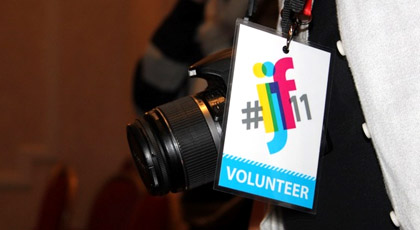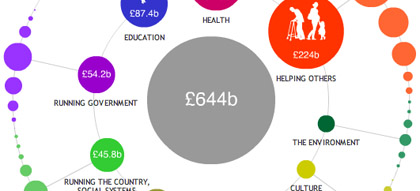
Journalists, a lot of journalists in this room probably, recoil at the G word. “Oh you want to turn my really serious story into a game…
This was Citizenside editor-in-chief Philip Trippenbach speaking in an #ijf11 session earlier today called Beyond the Article.
Trippenbach has been trumpeting the benefits of gaming for journalism for some time now. He made a convincing case for gaming at a recent Journalism.co.uk news:rewired event called, coincidentally enough, Beyond the Story.
Trippenbach has worked on interactive projects for the BBC and a host of other outlets. But clearly the “G word” is still a long way from taking root with most journalists.
He made a convincing case again today. This time – having joined citizen press agency Citizenside in January – for the power of gaming for citizen journalism initiatives.
The most powerful interactive form is gaming, in terms of interactive journalism, that is where the win is. When you talk about gaming baked right into the heart of a package, that is very profound.
With the addition of Trippenbach to its staff, Citizenside is certainly baking gaming right into the heart of its operation, and he outlined how it is using the form for two key purposes.
Citizenside users are encouraged to progress from level to level by accomplishing certain tasks, or “missions”, just like you did when you played computer games as a kid (or maybe as an adult too – according to Trippenbach more people in Western Europe and North America play computer games than don’t, although I forgot to ask where he got the data for that one).
And just like those computer games, the missions at Citizenside get harder as you go along, with the early stages requiring you to capture a relatively easy-to-obtain image, and the latter requiring, say, a good image of a state leader or an important newsworthy event.
Perhaps the most interesting thing Trippenbach talked about was how the agency uses that points-based gaming system not just for engaging users, but to help with assessment and verification of user-generated content, always a thorny issue for citizen press agencies.
If we get a picture from a level 35 user, well, it takes a long time to get to level 35 or 45, and the Citizenside editorial team know that that user has demonstrated commitment to our values.
So not only does the gaming element of the operation help engage users by breaking down their involvement into a series of incremental tasks and levels, it also is a huge advantage to Citizenside for an indication of the reliability of the content it is receiving.
If its someone who has submitted five packages and five of them have been refused, well, we know what that is, but if it’s someone with a 100 per cent record, well, fine.
We have a trust system that allows some users to post directly to the homepage and be post moderated.
As well as information about the user, Citizenside uses software to access data about the package itself.
This technical side of the verification process can potentially allows the agency to see whether an image has been edited in PhotoShop or uploaded to Flickr, and reveal when and where it was taken and uploaded.
I want to return to the issue of gaming and engagement quickly before I finish. However many journalists Trippenbach has seen turn their noses up at gaming, I have seen examples at this festival of gaming creeping in to some of the best and most popular mainstream journalism taking place.
Citizenside’s example of breaking the user engagement down into small, incremental stages has echoes in the Guardian’s MPs expenses app, which aimed to crowdsource the examination of the 458,000 documents published.
The app had two million hits in the first two days but, as the Guardian’s Martin Belam explained recently, users were unenthusiastic because the process hadn’t been broken down into achievable-seeming stages.
When a second batch of documents were released, the team working on the app broke them down into much smaller assignments. That meant it was easier for a small contribution to push the totals along, and we didn’t get bogged down with the inertia of visibly seeing that there was a lot of documents still to process.
So gaming doesn’t necessarily mean the fully-fledged computer games we play on a PlayStation, it can be the simple interactive engagement of the Guardian app, or the New York Times’ Budget Puzzle interactive in which you attempt to solve the deficit.
As Trippenbach acknowledged after the session, gaming is not yet taken seriously as a medium. But at Citizenside it may be the solution to the two key problems facing any citizen agency, engagement and verification, and for that reason you can bet that they take it very seriously.
See more from #ijf11 on the Journalism.co.uk Editor’s Blog.


